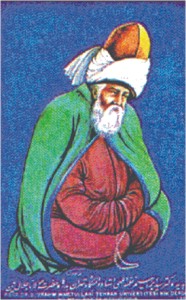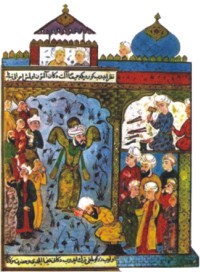
Inside
|
Rediscovering the spirit of Rumi As the Unesco-designated Year of Rumi (2007) ends, Dr M Shamsher Ali pays tribute to the great Sufi mystic Mavlana Rumi
Young people all over the world are trying to rediscover the spirit and essence of Rumi's thoughts. The question arises, why? What is the extra 'thing' that they crave for? Before answering this question we must first understand the significance of the era in which Mavlana was alive. Born on 30th September 1207 -- 2007 marks his 800th birth anniversary -- and dying on 3rd October 1284, Rumi lived during the time of the Crusades (1095-1291). Ironically, we remember Rumi in a new context against the backdrop of the theory of 'clashes of civilisations' propagated by Samuel Huntington. What is interesting is how Rumi, being a Muslim Saint of a commendable height, conquered the minds of people of all religions during the Crusades? Perhaps it is because there is a universal appeal in his sayings and writings.
He would not be what he was had he not traveled with his mystic father Baha 'uddin Walad, a well known respected preacher, jurisprudent and Sufi. Because of historical reasons, Baha had to travel to many lands. When the Mongols invaded Bulkh in 1219, Baha, with his family, left Bulkh to make pilgrimage to Mecca. After having completed the pilgrimage, the Seljuk king Alauddin Kayqobad offered him residence and a position in the Madrasa (University) of Konya. Baha, along with his family, lived for many years at Konya. Rumi, during those days, learnt a lot from his father, and after his death in 1231, succeeded his father's position as a teacher. Rumi's Sufi training did not begin until 1232 when Borhanuddin Tirmiji, a well-groomed disciple of his father, came to Konya. Together they traveled to Aleppo and Damascus, where Rumi met one of the greatest Sufi masters of all times, Ibn Araby of Spain. Tirmiji continued imparting the disciplines of Sufism till his death in 1240. In 1244 Rumi met Shams Tabrizi, (having the name Shamsuddin, “the great sun of religion”). It was Shams who brought out the latent perfections of Rumi. It is felt by many that Shams and Rumi struck each other like two lightening bolts, creating a new dimension in the spiritual world. Rumi left his teaching post, and went on retreat with Shams. This dismayed his students and it is reported that Shams vanished mysteriously at 1247. Some researchers report that he was murdered by Rumi's jealous students.
Rumi spent his lifetime attaining a great Sufistic height, and the entire philosophy of his work including the Masnevi, centered on love. He considered love as the soul of the world: out of love was created the universe, in love is the manifestation of the universe, in love is death, and in love lies the secret of life. The music comes out of the flute as an expression of love. Rumi himself writes about the song of the reed: “Listen to this reed-flute, how it is wistfully singing! Rumi's words of love for the Creator and the created hold a new charm to the younger generations. Young boys and girls have “things and things”, but things alone cannot give them peace of mind. In the permissive Western societies, whose culture now has started invading the value oriented Eastern societies also, young boys and girls have almost everything they want. Their parents give them all the things they need for living in a materialistic world, but do not give them “time” and “company”. This creates in the young people a hunger for love on one side, and a loss of identity on the other. According to Rumi, what one needs to avoid is an emphasis on “Egoism” and “Overconsumerism”. Although Rumi has suggested tricks to abandon the world, according to him “abandoning the world” does not mean to quit totally but rather, to lessen carnal greed and to give more attention to God. Thus, in an age where markets and even religious festivals have been hijacked and dominated by traders, over-consumerism is posing a serious threat to the establishment of a peaceful world order. A section of mankind has too much and another section has too little. How can we say, then, we love each other?
In a world battered by feuds and conflicts, torn apart because of hunger and poverty it is the words of Rumi which now assume a new significance. Rumi survived the Crusades through the acts of Divine love and universal fraternity. It is the same acts which can again make us overcome future predicaments of the human race. Love can act as the cure for all ailments, and as the best bridge between isolated hearts. Following Jalaluddin Rumi, can we not create a world in which any man's death anywhere could diminish us because we are involved in mankind? Can we not create a world in which love can act as the settler of all our differences, and as the healer of all our wounds? We certainly can, if in the spirit of Rumi, all our actions whirl, as if in a dance, around an axis of Love for the Creator and the created. Dr. M. Shamser Ali is the President of Bangladesh Academy of Sciences and Vice-Chancellor of Southeast University |
 At the very outset, it must be emphasised that the contemporary implications of Mavlana Rumi's thoughts encompass all communities of the world. Mavlana Rumi has been one of the most venerable Sufis of all times to come. His Sufism does not touch the hearts of Muslims alone, but people of different backgrounds.
At the very outset, it must be emphasised that the contemporary implications of Mavlana Rumi's thoughts encompass all communities of the world. Mavlana Rumi has been one of the most venerable Sufis of all times to come. His Sufism does not touch the hearts of Muslims alone, but people of different backgrounds.  Since Rumi lived most of his life in Konya in Turkey, the Turks claim that he is Turkish; the Afghans claim that, since he was born in Balkh, a city now located in Afghanistan, he must be considered as being of Afghan origin; and yet, many scholars agree, that Rumi is Persian, in view of the fact, that Balkh, the city in which Rumi was born, was a Persian city at the time of his birth, and also, in view of the fact that Rumi's books were written in the Persian language. The mystic's real name was Jalaluddin Muhammad, with whom the epithet Maulana (“Mevlana” in Turkish, meaning “our master”) has been added.
Since Rumi lived most of his life in Konya in Turkey, the Turks claim that he is Turkish; the Afghans claim that, since he was born in Balkh, a city now located in Afghanistan, he must be considered as being of Afghan origin; and yet, many scholars agree, that Rumi is Persian, in view of the fact, that Balkh, the city in which Rumi was born, was a Persian city at the time of his birth, and also, in view of the fact that Rumi's books were written in the Persian language. The mystic's real name was Jalaluddin Muhammad, with whom the epithet Maulana (“Mevlana” in Turkish, meaning “our master”) has been added.  After the disappearance of Shams, Rumi started writing poems of divine love reflecting his spiritual station, and alluding to the experiences of union. The majority of Rumi's ghazals ended with the name of Shams as a gesture of humility. Rumi's famous works include the Masnavi, (containing as many verses as Iliad and Odyssey put together, and about twice as many as that of the Divine Comedy). The Masnavi is basically a collection of fables and tales that Rumi took from the Quran and Hadith, and from the day-to-day events and problems, and has a moral content greatly affecting the lives of the people. The core content of other works, is again love -- love of the Creator and of the created. These other works include Divan-I Shams-i-Tabriz, (written over a period of thirty years, from the time of Shams' disappearance until Rumi's death), Fihi ma fihi (In It is What's in it), Majalis-i-Sab'a (Seven Sessions) and Makatib (Letters).
After the disappearance of Shams, Rumi started writing poems of divine love reflecting his spiritual station, and alluding to the experiences of union. The majority of Rumi's ghazals ended with the name of Shams as a gesture of humility. Rumi's famous works include the Masnavi, (containing as many verses as Iliad and Odyssey put together, and about twice as many as that of the Divine Comedy). The Masnavi is basically a collection of fables and tales that Rumi took from the Quran and Hadith, and from the day-to-day events and problems, and has a moral content greatly affecting the lives of the people. The core content of other works, is again love -- love of the Creator and of the created. These other works include Divan-I Shams-i-Tabriz, (written over a period of thirty years, from the time of Shams' disappearance until Rumi's death), Fihi ma fihi (In It is What's in it), Majalis-i-Sab'a (Seven Sessions) and Makatib (Letters).  Rumi's philosophy for the Creator and the created can make a great difference to our living styles. Mahatma Gandhi, who was tremendously influenced by Rumi, used to say, “There is enough in the world for everybody's need, but not for everybody's greed” -- a reverberation of the Quranic order itself. Gandhi often used to quote the words of Rumi, “unity is our desire, not division”.
Rumi's philosophy for the Creator and the created can make a great difference to our living styles. Mahatma Gandhi, who was tremendously influenced by Rumi, used to say, “There is enough in the world for everybody's need, but not for everybody's greed” -- a reverberation of the Quranic order itself. Gandhi often used to quote the words of Rumi, “unity is our desire, not division”.